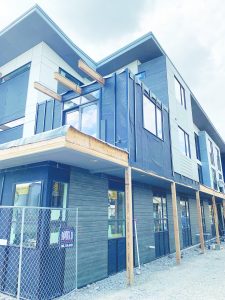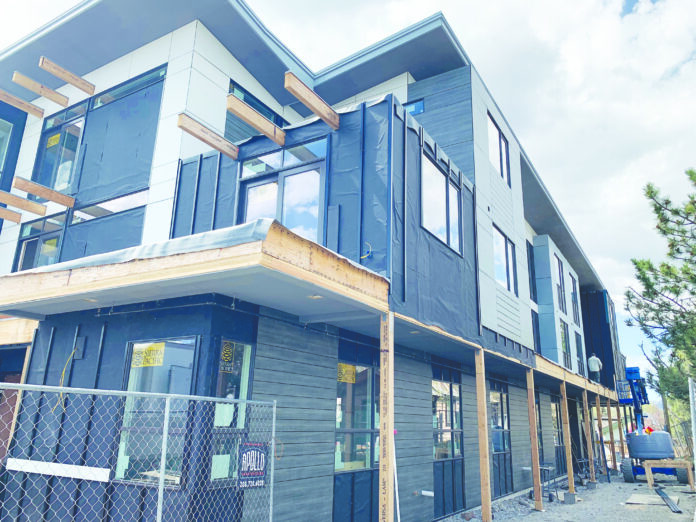$1.4 million still needed to complete the project
By Hayden Seder

The Advocates is on time and on budget to open new transitional safe housing in Hailey this October. The nonprofit organization operates the only shelter and subsidized housing program for survivors of abuse in rural central Idaho and serves Blaine, Camas, Custer and Lincoln counties.
The project, which was initiated in September of 2017, seeks to meet the demand for transitional housing for the community. The project will expand the organization’s current transitional housing units from four at their pilot housing units in an offsite apartment building to a total of 18. Twelve of those units will be located in the new building adjacent to The Advocates’ headquarters, and six of them will be located in a stand-alone building that will open in late 2020.
The newly-constructed, 13,000-square-foot building is located on a lot donated by a board member and his wife. The building will include four one-bedroom, eight studio, and six two-bedroom apartments, many of which can be combined to create larger living spaces. The units will be located on the top two floors while the ground floor will be dedicated to 4,500 square feet of private, on-site client and program support services.
A community meeting, workshop and gathering space that fits 25 people will potentially serve as a meeting space for other local nonprofits and open space, play yards and a community garden will ensure the space remains family- and pet-friendly.
To date, the new transitional housing project has raised 74 percent of the $5.5 million worth of funds needed to complete the project on time. Donations are being sought for the remaining $1.4 million.
The need for transitional housing for those affected by abusive situations cannot be understated; according to a press release from The Advocates, many families assisted by the organization are waiting nine to 12 months for a housing solution in our community.
“When they need affordable, private, autonomous housing, it is just not readily available,” said Tricia Swartling, The Advocates’ CEO.
“One of the things that all of our professional advocates have said is that once somebody is ready to transition out of shelter, it’s so hard for them to find safe, affordable housing,” added Shannon Nichols, The Advocates’ director of Development & Engagement.
A shortage of this kind of housing may put people at risk to stay in dangerous living situations or become homeless. Having transitional housing and the built-in support systems it provides can change the trajectory of an entire family or generation’s lives.
“It’s not just a house,” Nichols said. “It’s the 24-hour support, it’s case management, it’s helping recalibrate how you parent. All of those things are disrupted in an abusive home.”
Before delving into a full-blown transitional project, The Advocates purchased a fourplex on River Street three years ago, which has seen tremendous success. Already the waiting list for transitional housing is long enough to fill the new building as soon as it’s completed.
“We didn’t invent the idea of transitional housing,” Nichols said. “It’s something that’s been going on nationally and is really a successful way to prevent future violence and stop that cycle of violence from continuing on generationally. When people are able to have safe, stable housing with their kids, they’re able to learn a new way of interacting with family members in a respectful way.”
While The Advocates’ shelter is short-term, the organization hopes to provide transitional housing to families for nine months to a year which will hopefully provide families enough time to stabilize, get better jobs, and feel secure emotionally. Rent for each unit is formulated based on a percentage of each family’s income and may range anywhere from $50 per month to $250.
The ground floor of the project will be dedicated to a client service center which will help service not just those living in shelter, but provide walk-in services to community members as well. The area will include a reception space, advocacy rooms and a community room as well as alarmed access to the upstairs units for residents.
“Most of our clients are outreach clients, not shelter guests,” Nichols said. “Those clients get support, financial assistance, referrals, safety planning so we’ll be able to shift those services to this new center rather than getting them at the shelter.”
Each apartment unit includes a living space, sleeping space ranging from studio to multi-bedroom, private bathroom and access to laundry. The decision was made to keep building materials simple and solid so as not to require a lot of upkeep but maintain its integrity for years to come.



